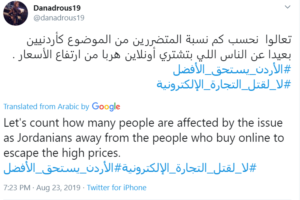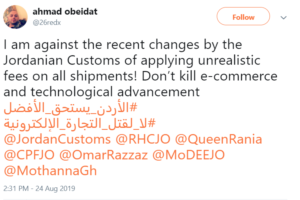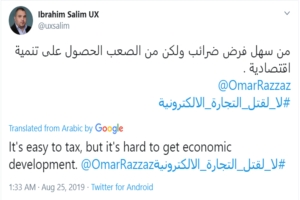Demonstrators protest customs reforms
Jordanian protests against the government’s new customs measures continued for a third day in the northern city of Ramtha, as demonstrators vented their frustration against a new policy that reportedly will limit the number of duty-free items that can be brought into the kingdom and impose a tariff on every item coming from overseas.
Many taxi drivers from Ramtha sell duty-free goods from Syria as a second source of revenue in order to bolster their income derived from driving over the border between Jordan and Syria.
Taylor Luck, an Amman-based journalist and political analyst, explained that while the full extent of the changes have yet to be released, the law formalizes regulations so that every overseas item must go through the customs system and be levied a minimum of five Jordanian Dinars (approximately seven US dollars). The tax could reach up to 50 Jordanian Dinars ($70 US) or more, he said. The law also limits the number of duty-free items people are able to bring into the kingdom, reducing Ramtha cab drivers’ most popular item — Syrian cigarettes — to one pack per customer.
“It’s going to slow down everything being brought into the country,” Luck told The Media Line. “[It also means that] Jordanian citizens who already rely on e-commerce for their clothes will face higher taxes or inflated prices.”
Jordanians took to social media to voice their objections against the new law.
Danadrous19 wrote on twitter: “Let’s count how many people are affected by the issue as Jordanians [turn] away from the people who buy online to escape the high prices.”

Ahmad Obeidat, who lives in the northern city of Irbid, tweeted a popular slogan going around Twitter amongst Jordanians: “I am against the recent changes by the Jordanian Customs [authority] of applying unrealistic fees on all shipments! Don’t kill e-commerce and technological advancement.”

In addition, the new rules will allegedly increase the gravity of smuggling from a misdemeanor to a felony.
These new customs rules are “adding spark to years of discontent,” said Luck.
“The continuing protests are a sign that protesters are not only rejecting current government decisions, but [also] broken promises by previous governments and the overall economic situation in the kingdom, which will not change anytime soon,” Luck added.
Bringing the government to task on its general economic policies, Amman-based Ibrahim Salim [UX] tweeted: “It’s easy to tax, but it’s hard to get economic development.”

Luck said the government has failed to follow through with its pledges to create more jobs in the northern part of the kingdom and to allow more residents to drive across the Jordan-Syrian border.
In the meantime, Jordanian King Abdullah II, has left it up to the parliament to deal with rioters, carefully protecting his popularity among Jordanians.
“Jordanians… see [Abdullah] as a neutral figure: one who is on the side of the people and outside politics,” said Luck.
In addition to increasing the revenue generated through the formal customs system, Jordan is also trying to cut down on lost revenue which are a result of the smuggling of goods in places like Ramtha, he said.
Luck further noted that the tougher regulations on customs is part of the Jordanian government’s “new strategy to crack down on smuggling.”
“Besides cigarettes, there has been a rise of smuggling of illicit Syrian goods, [such as] drugs, guns and counterfeit pharmaceuticals, which has only been increasing over the last year,” he said, citing figures from the Jordanian government which maintains that the country’s coffers have lost out on approximately $183 million dollars in tax revenues the first half of 2019 because of the smuggling.
The protests are taking place along the backdrop of a Jordanian economy already in tatters, with an approximately 19 percent unemployment rate overall and a 40% unemployment rate among youth, according to Oraib Al-Rantawi, the founder and director of the Al Quds Center for Political Studies, which examines political reforms and democratic transition in Jordan.
Al-Rantawi said the best solution for the protesters would be for them to find proper jobs inside Jordan.
“The question is whether the government has [the ability to provide these jobs], and I don’t think they do,” Al-Rantawi said.
For now, he believes the government will not implement the new policy while tensions are still running high and will “turn a blind eye” towards the smuggling activities in Ramtha. Still, he said, eventually a solution will be reached.
“We are a tribal society and we resolve things not by going to go court but through compromise,” he said.
According to analyst Luck, an initial agreement was reached late Saturday night allowing Ramtha residents to bring in goods from Syria other than cigarettes, such as food and other non-perishable products from Syria, albeit in limited amounts.
He ultimately doesn’t believe the riots will lead to a change in government policy and does not anticipate that the riots will be long term.
“While [the protestors] won’t be calmed down immediately or easily, the riots won’t spread,” Luck asserted.
(Tara Kavaler is an intern in The Media Line’s Press and Policy Studies)